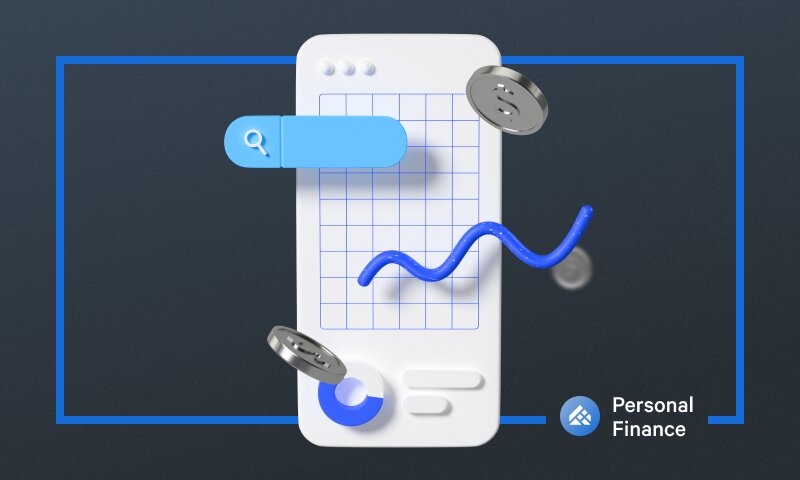Your financial well-being isn't just about having a fat bank account (though that doesn’t hurt). It's about having the freedom to chase your dreams without hesitation.
Think of personal finance as your playbook for success. You’re not just managing dollars and cents when you take charge of your finances. You’re building a solid foundation for your future. It's about having the confidence to face any financial challenge head-on, knowing you have the skills and knowledge to overcome it. By understanding how to budget wisely, invest intelligently, and save diligently, you're setting yourself up for success in every aspect of your life.
Understanding how money works is key to building the life you always wanted. And this course can help you get there.
From creating a budget you can actually live with to planning your golden years, these fundamental steps lay the groundwork for empowerment.
How to Create a Budget
Building a budget means figuring out what's coming in, breaking down expenses into essentials and extras, and stashing away some cash for a rainy day. It's all about staying organized and focused on what matters most. And remember, tweaking that budget as your finances shift is vital for staying ahead and reaching your goals.
In Lesson 1, we’ll dive deep into crafting a simple, effective budget you can stick with.
Lesson 1: How to Create a Budget
How to Start Saving Money and Build Your Emergency Fund
The reality: most Americans are one minor crisis away from financial trouble.
Your emergency fund should ideally cover you for three to six months, but everyone's situation is different. It all comes down to factors like your job stability and lifestyle.
No matter where you’re starting from, there are budgeting moves you can make to start slowly building up your rainy day fund. You can also level up your savings fund by opting for higher-yield accounts like a high-yield savings account or certificate of deposit. Remember: every little bit gets you closer to your goal.
In Lesson 2, we're getting down to brass tacks to show you how to kickstart your savings game, even if you feel strapped.
Lesson 2: How to Start Saving Money and Build Your Emergency Fund
How to Manage Debt
Mastering debt is all about being financially savvy and having a solid game plan. You have to keep an eye on essential numbers like your debt-to-income ratio and credit utilization – they give you the real lowdown on where you stand. Aim for a lower debt-to-income ratio for a healthier financial picture, and keep that credit utilization rate down to boost your credit score and borrowing power.
Knowing your net worth – what you own minus what you owe – gives you the big picture. It helps pinpoint where to cut down on debt and pump up your savings.
In Lesson 3, we're getting deep into debt – offering advice on how you could handle it like a pro, how debt can be leveraged, and what you could do if it starts feeling like too much.
Lesson 3: How to Manage Debt
How to Build Credit
Your credit score is one of the primary metrics lenders utilize to gauge your creditworthiness, influencing your ability to secure loans, credit cards, and favorable interest rates.
If you’re building your credit score, you can adopt a few essential healthy habits. Pay your bills on time, every time. Focus on keeping your debt-to-income ratio (i.e., how much you compared to how much you bring in) low. And don’t take on more debt than you can comfortably afford.
In Lesson 4, we’re talking about building a solid credit history and good credit score from scratch.
Lesson 4: How to Build Credit
How to Start Investing
When you're starting out, investing is about weighing your options and understanding their ins and outs. Take real estate, for instance — it can offer steady returns and good tax benefits. But don't forget about the stock market or high-yield savings accounts — they also have their perks. When it comes to retirement savings, Roth IRAs, 401(k)s, and traditional IRAs can be your best friends, offering tax-efficient ways to stash away for the future.
It's all about knowing your net worth, crunching those numbers, and strategically diversifying your portfolio across different asset classes — whether fractional real estate or diving into ETFs. It's a journey toward building wealth while playing it smart with risks and rewards.
In Lesson 5, we’re diving into investing vehicles, investment strategies, and practical tips for getting started.
Lesson 5: How to Start Investing
How to Start Planning for Retirement
Starting a retirement plan is crucial to secure your financial future. The first step is assessing your current financial situation, including income, expenses, and savings. With this understanding, you can determine how much you can comfortably set aside for retirement each month. Next, research different retirement account options, such as 401(k)s, IRAs, or Roth IRAs, and consider which best aligns with your financial goals and circumstances.
Once you've chosen a retirement plan, establish a systematic approach to contribute regularly. Starting early and staying disciplined are the cornerstones of a successful retirement plan.
In Lesson 6, we talk setting up your retirement plan, finding the right professional to help, and staying the course to build a financially secure future.
Lesson 6: How to Start Planning for Retirement
Why Is Financial Literacy Important?
Personal finance isn’t a one-and-done lesson. Staying informed about financial trends, new investment opportunities, and changes in economic conditions is crucial. Continuously educating yourself ensures that you can make informed decisions around your investing and spending habits and adjust your strategies to meet your evolving financial goals.
In Lesson 7, we’re breaking down the benefits of committing to your education and sharing resources to help you stay connected to the financial world.
Lesson 7: Why Is Financial Literacy Important?
FAQ
Who can invest?
How much can I invest?
What type of products are available on Arrived?
Will I have any responsibilities for managing properties I invest in? If not, who is responsible?
What type of returns can I obtain?










